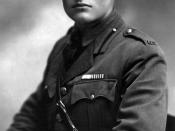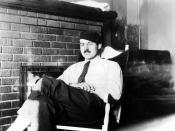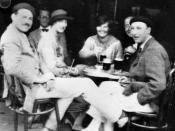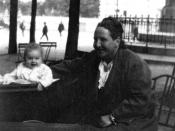During the lost generation of the mid-1920ÃÂs, for most people the theme of lifeÃÂs meaning was turning from the question of essence, ÃÂwhat it was all about,ÃÂ to existence, ÃÂhow to live in it.ÃÂ In Ernest HemingwayÃÂs novel The Sun Also Rises, the main character Jake Barnes demonstrates the reason for this polarity is the inability to rise above that mediocrity. (Wagner-Martin, 21-25)Early in the novel, Cohn tells Jake that he yearns to get away from Paris, and to travel to South America. Jake presents himself as someone who realizes that ÃÂyou canÃÂt get away from yourself by moving from one place to anotherÃÂ, when he instructs Cohn to start living his life in the moment, in Paris. However, as we begin to further explore JakeÃÂs character, we realize that his advice to Cohn is ironic because Jake himself has not yet learned how to live according to his own advice.
Jake spends many slumberless hours tormented by thoughts of his impotence and by his love for Brett. The injury continues to be an ongoing source of distress and frustration whenever they are together. Evidence of JakeÃÂs distress is clear when Brett turns away from Jake in the cab in response to JakeÃÂs attempt at intimacy. (Wagner-Martin, 30-41) Brett states that she does not ÃÂwant to gothrough that hell again.ÃÂ (Hemingway, 34) Furthermore, Jake feels he is about to enter a recurring nightmare, when Brett tells him that ÃÂshe is so miserable.ÃÂ (Hemingway, 32)Jake is constantly battling internal demons and acknowledges that all he really wants to do is to know ÃÂhow to live in itÃÂ (Hemingway, 152)ÃÂit referring to the world, to the new and constantly changing war reckoned society, and to the world of emotional relationships. Certain literary critics have equated specific characters within the novel who might provide Jake with an example of exemplary behaviour. For example, the critic Robert Fleming, suggests that Count Mippipopolous is an example of a ÃÂcode heroÃÂ or ÃÂtutorÃÂ, due to the fact that his minor flaws are ÃÂoutweighed by his strict observation of code.ÃÂ (Fleming, 69-72) Unlike Jake, the Count values things he loves in the present, and exemplifies bravery and elegance under pressure. Fleming states that the Count imparts lessons to Jake that will ÃÂthat will help [him] toward a philosophy of life.ÃÂ (Fleming, 74) Scott Donaldson, another critic, reasons that it is in fact Bill Gorton, through humour directed at ideas and organizations, not human beings, who provides a form of respectable behaviour. (Donaldson, 19-41)JakeÃÂs being in the taxi with Georgette and Brett portrays a major aspect of the novel. The characters are constantly moving about, like HemingwayÃÂs ÃÂlost generation.ÃÂ Throughout the novel, the characters go by taxi, car, bus, or foot. This seemingly random movement represents the equally random lifestyles of the ÃÂlost generation,ÃÂ always moving about but never fulfilling their quest for a better world. (Wagner-Martin, 58-65)The fact that Jake travels to Madrid at the request of Brett proves that he is still in love with her. James Nagel believes that JakeÃÂs voyage to BrettÃÂs side proves that he cannot escape fateÃÂs consequences and ÃÂis resigned to the pain that continued association with her is likely to bring.ÃÂ (Nagel, 87-108) Jakes impotence is a strange irony. Even though he and Bill joke about the affliction, JakeÃÂs condition shows just how expatriate life isÃÂimpotent and unfulfilling. (Wagner-Martin, 122-150) The continuation of Brett and JakeÃÂs relationship can be called into question and may signify a change in JakeÃÂs outlook on life when he replies to BrettÃÂs lament about the good time they could have had together with the storyÃÂs final lines ÃÂIsnÃÂt it pretty to think so?ÃÂ (Hemingway, 251)Works CitedDonaldson, Scott. "Humor in The Sun Also Rises.ÃÂ New Essays on The Sun Also Rises.
Cambridge University Press, 1987. 19-41.
Flemming, Robert. "The Importance of Count Mippipopolous: Creating the Code Hero."Arizona Quarterly. 44.2 (1988): 69-75.
Hemingway, Ernest. The Sun Also Rises. New York: Scribner Paperback Fiction, 1954.
Nagel James. "Brett and the Other Women in The Sun Also Rises." The CambridgeCompanion to Hemingway. Cambridge University Press, 1996. 87-108.
Wagner-Martin, Linda. Ernest Hemingway's The Sun Also Rises: A Casebook. NewYork: Oxford University Press, 2002.





